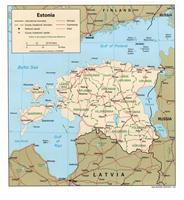Estonia - a small country with big opportunities
Adelina Marini, June 23, 2009
 850 euro is the average salary in Estonia I learn during my conversation with the ambassador of the Baltic state in Bulgaria H.E. Rein Oidekivi. This is much more than the average salary in Bulgaria. Inevitably with ambassador Oidekivi we start discussing the crisis and how his country is being affected because in a moment of such a global financial and economic crisis, the information about the real situation of a country is extremely valuable and expensive. And while ambassador Oidekivi tells me how this "low" salary is the reason for some 30,000 Estonians to work across in Finland and Sweden, I'm looking at the data which the embassy has very kindly given me about the economic situation in comparison to other countries.
850 euro is the average salary in Estonia I learn during my conversation with the ambassador of the Baltic state in Bulgaria H.E. Rein Oidekivi. This is much more than the average salary in Bulgaria. Inevitably with ambassador Oidekivi we start discussing the crisis and how his country is being affected because in a moment of such a global financial and economic crisis, the information about the real situation of a country is extremely valuable and expensive. And while ambassador Oidekivi tells me how this "low" salary is the reason for some 30,000 Estonians to work across in Finland and Sweden, I'm looking at the data which the embassy has very kindly given me about the economic situation in comparison to other countries.
There I see that according to Standard & Poor's and Moody's Estonia is 4th in a table of 10 eastern European countries in GDP per capita after Slovenia. the Czech republic and Slovakia - with 20,754. For comparison Bulgaria is with only little above Belarus - 12,372 and 12,344 respectively. Romania is also ahead of us with 12,698. The credit rating of Estonia was A in March while Bulgaria's is BBB where A means medium low risk and BBB means medium risk.
Estonia has lower state debt - 4.8% of GDP with which it takes the first place among the EU member states. Bulgaria and Romania score second with 14% each. Nevertheless ambassador Oidekivi tells me that Estonia, in fact, was in quite critical situation because of, actually, 2 crises. The first was internal and expected but the global financial crisis sharpened it. The reason is that with each year, as in Bulgaria, the GDP was constantly growing - 10-12% which is too much because the Estonians did not manage to suppress the inflation below 3% because of the constant rise of salaries and the prices of services. With such an intensive growth it is impossible to maintain low inflation which was the reason for Estonia not to be able to start the procedures for euro area membership.
His Excellency also says that the fiscal policy of Estonia is much similar to that of Bulgaria which currency board is, in fact, an exact copy of the board of Estonia, introduced much earlier - in 1992. And from 1994 the Baltic state introduces the flat taxation which Bulgaria introduces as well  but much later - 2007. 3 are the EU member states with currency board - Bulgaria, Estonia and Lithuania but Latvia has something very much alike (the country is on the brink of bankruptcy, in spite of the aid from the IMF and the EU). The Bulgarian financial minister Plamen Oresharski recently said in an interview with the AP that the crisis in Latvia might influence Bulgaria badly because both countries are pegged to the euro. But he added that the Bulgarian financial system is much more stable than Latvia's.
but much later - 2007. 3 are the EU member states with currency board - Bulgaria, Estonia and Lithuania but Latvia has something very much alike (the country is on the brink of bankruptcy, in spite of the aid from the IMF and the EU). The Bulgarian financial minister Plamen Oresharski recently said in an interview with the AP that the crisis in Latvia might influence Bulgaria badly because both countries are pegged to the euro. But he added that the Bulgarian financial system is much more stable than Latvia's.
But let's go back to Estonia and the story which its ambassador to Sofia H.E. Rein Oidekivi is telling me. And as I said earlier, the real situation of a country is a very valuable asset. In addition to this ambassador Oidekivi says that days ago there were a lot of speculations that Latvia will devaluate its currency with some 20-30%. According to him though these speculations had been started by people who are interested in this - like people who have credits that now cannot pay back. In Estonia there is no danger of devaluation because the currency there is pegged to the euro. Beside this 95% of the credits are related to the euro too.
Mr. Oidekivi continues with the resemblances between Estonia and Bulgaria - there also taking a credit was quite simple for the last few years which led to mass crediting and a great increase of the number of mortgages. This led to 20-25% increase of the real estate market. "This situation was quite virtual and we knew very well that it would lead to overheating of the economy. But then the government decided not to put more money in the economy so as not to heat it more. Instead it started to collect reserves", explains ambassador Oidekivi. At the moment Estonia's reserves are 1.6 bn euro which seems pretty enough to overcome the current internal crisis.
Estonia has also started cutting of expenditures by 10% and even more. For now the society accepts that, says the ambassador but with every cutting things complicate. For example the day before I met the Estonian diplomat, there was a small strike. Only the pensions and the salaries of teachers were left unchanged. The pensioners were among the worst hit by the changes after Estonia left the USSR. Nevertheless, the authorities in Tallinn are determined to continue with the euro area membership and H.E. Rein Oidekivi explains why: "Because in anyway our currency is pegged to the euro which is a very good reason because foreign investors have more confidence in a country that uses the euro. In spite our explanations that we cannot remove the currency board in one night because it has to pass 2 or 3 readings in Parliament, this makes investors more conservative and we need them".
He gave another example for resemblances with Bulgaria and that is that Estonia still manages to keep its budget deficit below 3% which only 7 EU member states succeed so far to do, among which Bulgaria. The problem of Bulgaria though is that in the end of the day no one is certain what exactly the budget deficit will be in the end of the year. Another very important thing is that obviously the Estonians trust their government for all actions it undertakes. Unlike Bulgaria.
For now Estonia does not plan to take any loans because it cannot afford to pay them back, It would only accept European money in support of projects in Estonia. In this regard, Tallinn supports more common European approach in the field of finances but is against the common tax policy because smaller and less developed countries still need investments to catch up with the older and more developed member states. Some, obviously, want to achieve this, they have the political will and the support of their citizens.